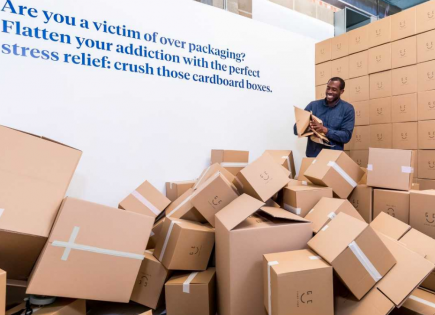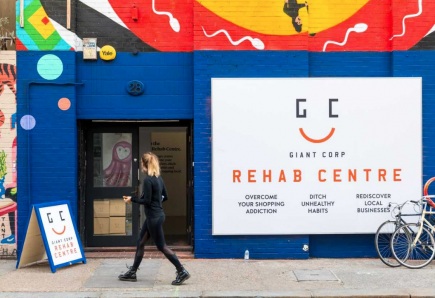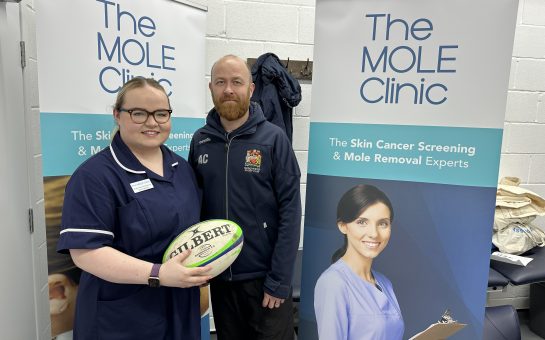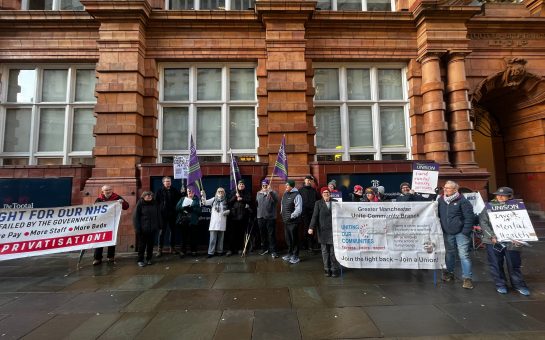With one in three Brits addicted to online shopping retailers, Mancunian Matters were shocked to see that Manchester falls second among UK cities.
Birmingham tops the chart with 38% while 35% of Mancunians can’t say no to buying online.
Experts predict that on average 100,000 businesses could close in the next decade as more people turn to the convenient but addictive online retail shopping.
That’s why Fintech company iZettle are on a mission to get Brits back on the high street.
The ‘Giant Corp Rehab Centre’ ran earlier this month in Shoreditch, London in an aim to combat compulsive shopping addition and help engage with local businesses.
The centre was run by trained therapists and offered unique techniques such as ‘Meditative Box Therapy’ in which patients flattened cardboard boxes as a form of stress relief.
Mancunian Matters spoke with Sally Baker – a therapist who says she can treat people in six weekly sessions while change can be seen after just one or two chats – as she was involved in the project to help shed a light on the addiction.
Q) Hi Sally. Could you start by telling me some more details on compulsive online shopping addiction?
A) Just because some people have a shopping spree or spend a bit more than they wanted on that spree, doesn’t necessarily mean they have a problem. The warning signs that your online shopping habit is becoming an addiction is that you are turning on your iPad, or your smartphone or going onto a computer anytime you’re feeling bored, sad, lonely or angry.
Having met people for two days now who self-declare they have a problem with online shopping, there are two kinds of scrolling: morning scrolling and evening with two different types of emotional driver, procrastination in the morning and replacement activity in the evening.
Q) How does the addiction first manifest itself?
A) It takes incremental steps, you might not find yourself going to the high street anymore, you’re becoming aware that your friends or family are commenting ‘oh another parcel’ then you start having the parcels delivered to the local pick up point and you start hiding your purchases. Sometimes they aren’t even coming out of their wrappers.

FLATTENING BOXES: Ever tried crushing cardboard to relieve stress?
You’ll know it’s beginning to be a problem when your online shopping becomes something you are keeping a secret. At the moment of purchase you might feel quite high and quite up, but that emotion quickly flips into something you’re quite embarrassed or even ashamed about.
Q) What treatment approaches are available for this?
A) On the NHS there’s cognitive behavioural therapy, if you’re lucky and can wait you might get between six-eight sessions. I don’t actually think it works as I don’t work with the conscious mind. I only work with the subconscious, which is why I look for the triggers that make people online shop or use class A drugs etc. and then release and resolve those triggers.
Q) Which treatment would you say is the most effective?
A) I use neural linguistic programming (NLP) and I’ll use emotional freedom technique (EFT). When we’ve cleared all the triggers for the compulsive behaviour I use hypnosis. But I don’t think you can go straight to the hypnosis, you need to clear the crud first.
And once you’ve cleared that the hypnosis is brilliant for supporting changes in behaviour, which is what we all want: changes in behaviour and how you think and feel about yourself.
Q) Do you believe addiction can be eradicated?
A) Absolutely eradicated, we’re all born clear and free of these addictions, they are just strategies a person has developed to cope with life’s stresses and strains. To a degree they will work but often have a big downside, if it’s compulsive shopping or gambling then it’s people going into massive amounts of consumer debt, in which certain strategies can work better for you.
Q) Do you believe it’s an increasing problem in the UK?
A) I think it’s an increasing problem in the Western world, I think we’ve all got Brexit stress and Trump stress. It’s a generalised increase of stress, I think people are more disconnected, there are a lot more people living as singles and not enough healthy relationships and we’re all compensating for human connection in our lives.
Human connection improved our mental & physical health outcomes https://t.co/GMwd3uayki
— Sally Baker Therapist (@sally_Therapist) October 13, 2018
Q) How is the addiction affecting people’s everyday lives?
A) You can see it on the bus and on the trams, you go onto a tram in Manchester and everybody’s on their mobile phone, everyone’s zoned out. You could go onto a bus in Manchester and people would speak to you as a visitor. Now everyone’s on their mobile phones so it’s a massive cultural shift.
People turn to online shopping because it’s quick, convenient and they think it’s the answer. It also satisfies them: you get a momentary burst of dopamine that lasts a few minutes and then it’s gone and then you’re back to feeling sad.
Q) How many items does an addict buy per day?
A) I spoke to people at the pop-up who have between three-eight deliveries a day from online retailers, but they say it’s okay as it isn’t all for them and they do all their household shopping online. All retail experiences that they could’ve organised with local retailers have gone and there’s a complete disconnection.
Q) Is there a specific retail website that people tend to go to for their ‘fix’?
A) Usually the big ones people know about, particularly fashion retailers for people in their 20s and 30s, the iZettle pop up doesn’t pinpoint a specific company’s fault, it’s about them all, they are designed to be as compulsive and compelling as possible, so you want to come back.
Q) Do you believe the pop up created by iZettle was successful in allowing people to realise it’s very much a real addiction and needs to be taken seriously?
A) I do think the iZettle experience really opened people’s eyes that they have normalised online shopping. I had several people say to me ‘I don’t really do online shopping I just do Amazon’, and that is part of it.

OVERCOMING ADDICTION: MM found out some online shoppers would receive three-eight deliveries a day
The iZettle really opened people’s eyes and they would now reconsider going to small independent retailers where their experience would enrich them with human connection – the shopping would be more measured as the experience would be longer than buying online.
If you would like to contact Sally and see a full list of her services, head to www.workingonthebody.com



